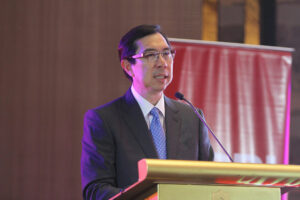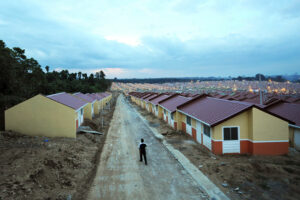Cooling inflation to drive demand for loans

BANK of the Philippine Islands (BPI) expects slower inflation to help drive loan demand as it gives the Bangko Sentral ng Pilipinas (BSP) room to cut benchmark borrowing costs further.
“They reported inflation (on Tuesday) at 1.4%. So, that really provides the central bank room to ease monetary policy, which will make consumers a little bit more confident and give corporates the reasons to borrow and to continue to invest,” BPI President and Chief Executive Officer Jose Teodoro K. Limcaoco said in an interview aired on Money Talks with Cathy Yang on One News on Wednesday.
Mr. Limcaoco said consumer confidence remains “very high” even amid the uncertainty caused by the Trump administration’s tariffs and their potential impact on global trade.
“So, it’s looking good for the Philippine economy. We should grow by maybe 5.5% this year given that we have the elections also. And that should be good for the banks.”
Philippine headline inflation eased to 1.4% in April, the slowest pace since November 2019, from 1.8% in March and 3.8% in the same month a year ago. For the first four months, the consumer price index (CPI) averaged 2%, at the low end of the BSP’s 2-4% annual target.
On Wednesday, BSP Governor Eli M. Remolona, Jr. told Bloomberg that the central bank is open to cutting key rates by 75 basis points (bps) more this year following the April CPI result.
The Monetary Board last month resumed its easing cycle after an unexpected pause in February, cutting benchmark rates by 25 bps to bring the policy rate to 5.5%. Its next meeting is on June 19.
“We believe that the Bangko Sentral has room to lower rates, which means there’s a likelihood that they will be cutting policy rates this June — if not this June, then certainly by the next meeting — given the very controlled inflation and the very strong Philippine peso versus the dollar,” Mr. Limcaoco said.
“For BPI, that means time deposit rates should come down in the immediate term, which will help us preserve our net interest margins. But over the long term, loan rates and asset yields will come up, which will shrink our net interest margins over the long run. But all in all, it looks good for credit quality. It looks good for net interest margins. And for the banks, you just need a very disciplined approach to preserving your margins and raising funds.”
Mr. Limcaoco said BPI aims to grow its loan book by 11-12% this year, with the bank expecting its consumer portfolio by about 20% to make up close to 30% of its total loans from the current 28.8% share.
“We’re making progress as a bank to shift our book towards the consumer sector and be more inclusive as a financial institution,” he said.
He added that there could be some asset quality risks as they continue to increase lending to the consumer sector and grow their customer base, like other Philippine banks, but the overall impact is “very manageable.”
BPI’s net income increased by 9% year on year to P16.6 billion in the first quarter.
Its shares closed at P138 apiece on Wednesday, down by P2 or 1.43% from the previous day. — A.M.C. Sy




